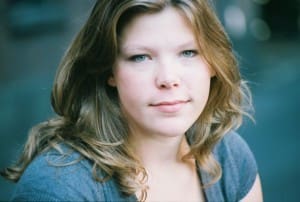- Skip to primary navigation
- Skip to secondary navigation
- Skip to main content
- Skip to primary sidebar
Here’s To Breathing! Kate Belden Talks Outdoor Performance
 Connecting Body and Voice: The Challenges of Outdoor Performance
Connecting Body and Voice: The Challenges of Outdoor Performance
I enter screaming, from downstage, fall flat on the ground, dodge eight women with bo staffs, screaming, get trapped center stage, then run off, still screaming. And while this all requires a lot of energy, it’s the easy scene for me this act. I run, I tumble, I dodge, no big deal. The hard part this act for me is the scene before, when I just talk a bit and walk around a little. The walking around is necessary to theatre in the round as no one wants to be stuck directly behind an actor for too long. But the really important thing, most important, is making sure that the audience members behind me and the one on the opposite side of the stage and forty feet away, can hear every word. They’re Shakespeare’s, important to the plot, and pretty well written. It’d be a shame for someone to miss out just because I didn’t do the basic, and usually, hardest part of performing out doors.
I have to start long before the show does, trying to get rid of the tension in my shoulders and throat. Anything extra I have to fight during the show is going to slow down how fast I can get the air in, and fighting my vocal chords is not a good idea if I want to keep my voice. I try to think of the air falling in to my lungs and relax across my abdomen, so I can get this great huge belly full of air quickly. And then I do my best to resonate through my body, projecting out across the space without extra force, but allowing the air and my body to do all the work. The more I ‘try’, it seems, the more I get in the way, and thinking more about ease and placement keeps me from just yelling at my scene partners.
Though, in that scene where I just talk and walk a bit, yelling fits the moment. I’m mad at the mob of people I’m talking to, so if I yell, I just need to make sure I do it in a way that I’ll keep my voice for the whole run. No, the real challenge in this show for me, is having a close moment with a dear friend, three feet away from me, while still getting heard by the person sitting across the courtyard. It’s counter intuitive to fill my lungs and project when I’m saying something I don’t want everyone in the room to hear, but it has to happen, because, again, there’s a plot, and this information is key to the audience, or we wouldn’t say it in the show.
Same process: ease, breathe, release. And it’s amazing to me, when all that happens, how my lines register to the other actor, and the physical response I have to speaking. Because I can’t have any tension in my voice, the line comes out earnest. Because my stomach muscles are engaged in releasing to breathe, they don’t have the opportunity to be defensive or hold anything back. My voice vibrates my chest and face, giving me little chance to filter or force a response. It’s lovely and kind of addicting.
Which is where a common hang up for me comes in. When a moment is so good, or so terrible, and my technique starts to falter because of dedication to the moment or, dedication to fixing the moment, is a distraction. Performing, especially Shakespeare, out doors requires a definite muscularity. We wield weapons and fight, roll and tumble on the ground, make pronouncements and decrees, argue and cheer on. And as challenging as all the extra layers can become, the basic issue, the one every performer is always working on, is the balance of technique and inspiration, that craft that we’ve dedicated ourselves to.
We do a great job of it in this show. Scott’s given us room to find our way, but has kept ever present on our minds during this process the need to do it right, to do it well, and to do it audibly. I’m so impressed with myself that I get to work with these people on this show, I feel absolutely in the right place at the right time, and so very fortunate. Here’s to breathing!
Kate Belden
Marullus in “Julius Caesar”

Reader Interactions